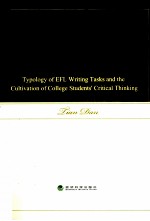图书介绍
英语写作任务类型与大学生批判性思维能力培养pdf电子书版本下载

- 田丹著 著
- 出版社: 北京:经济科学出版社
- ISBN:9787514124187
- 出版时间:2012
- 标注页数:209页
- 文件大小:8MB
- 文件页数:221页
- 主题词:英语-写作-教学研究-高等学校
PDF下载
下载说明
英语写作任务类型与大学生批判性思维能力培养PDF格式电子书版下载
下载的文件为RAR压缩包。需要使用解压软件进行解压得到PDF格式图书。建议使用BT下载工具Free Download Manager进行下载,简称FDM(免费,没有广告,支持多平台)。本站资源全部打包为BT种子。所以需要使用专业的BT下载软件进行下载。如 BitComet qBittorrent uTorrent等BT下载工具。迅雷目前由于本站不是热门资源。不推荐使用!后期资源热门了。安装了迅雷也可以迅雷进行下载!
(文件页数 要大于 标注页数,上中下等多册电子书除外)
注意:本站所有压缩包均有解压码: 点击下载压缩包解压工具
图书目录
Chapter 1 Introduction 1
1.1 Research Purpose 1
1.2 Research Questions 2
1.3 Research Methodology 3
1.4 Significance of the Study 5
1.5 Outline of the Book 7
Chapter 2 Literature Review 9
2.1 Critical Thinking 9
2.1.1 Definition of Critical Thinking 10
2.1.2 Critical Thinking Skills 12
2.1.3 Critical Thinking in Education 16
2.1.4 Studies on Critical Thinking Home and Abroad 22
2.2 Writing Tasks 24
2.2.1 Types of Writing Tasks 25
2.2.2 Task-based Writing Pedagogy 29
2.3 Action Research 34
2.3.1 A Historical Overview of Action Research 35
2.3.2 Definition of Action Research 38
2.3.3 Classification of Action Research 40
2.3.4 Characteristics of Action Research 41
Chapter 3 Teachers'Perception towards Critical Thinking and Students'Performance in EFL Writing 45
3.1 College English Teachers'Perception towards Critical Thinking 45
3.1.1 Participants 46
3.1.2 Instruments 47
3.1.3 Results and Findings 48
3.2 Assessment of Critical Thinking Abilities in EFL Writing 53
3.2.1 Setting and Participants 53
3.2.2 Instrument 55
3.2.3 Inter-rater Reliability 58
3.2.4 Research Procedure 59
3.2.5 Results and Discussion 60
Chapter 4 The First Round of Action Research 64
4.1 Research Purposes 64
4.2 Planning 65
4.2.1 Transfer from Product Writing to Process Writing 65
4.2.2 Teachers'Written Feedback Focused on Writing Content 66
4.2.3 Teachers'Feedback in the form of Socratic Questioning 68
4.3 Action 70
4.4 Observation 72
4.4.1 Obvious Achievements in Evaluation and Explanation 73
4.4.2 Arising Problems 74
4.5 Reflection 76
4.5.1 Teachers'Feedback in the form of Questions 76
4.5.2 Teachers'Feedback on the Content of Writing 77
4.5.3 Learners'Writing Interest 79
4.5.4 Writing Based on Topic Tasks 80
Chapter 5 The Second Round of Action Research 83
5.1 Research Purposes 83
5.2 Planning 84
5.2.1 Integrating Reading Activities into Writing 84
5.2.2 Writing Based on the Picture Task 86
5.2.3 Brainstorming 87
5.2.4 Peer Feedback 88
5.3 Action 89
5.3.1 Pre-Writing Stage 90
5.3.2 Writing and Revising Stages 91
5.4 Observation 92
5.4.1 Interpretation 92
5.4.2 Analysis 93
5.4.3 Evaluation 94
5.4.4 Inference 95
5.4.5 Explanation 96
5.4.6 Self-Regulation 97
5.4.7 Arising Problems 99
5.5 Reflection 101
5.5.1 Peer Feedback 102
5.5.2 Process-Oriented Writing and Self-Regulation 103
5.5.3 Interest in Writing Tasks 105
Chapter 6 The Third Round of Action Research 108
6.1 Research Purposes 108
6.2 Planning 109
6.2.1 Constructivism and Writing Tasks 109
6.2.2 Task Complexity and Task Difficulty 111
6.2.3 Learning with High Motivation 114
6.2.4 Self-Evaluation 116
6.3 Action 117
6.3.1 The First Stage 117
6.3.2 The Second Stage 118
6.3.3 The Third Stage 119
6.4 Observation 122
6.4.1 Interpretation and Analysis 123
6.4.2 Evaluation 124
6.4.3 Inference 126
6.4.4 Explanation 126
6.4.5 Self-Regulation 128
6.5 Reflection 129
6.5.1 Exploring-Typed Writing Tasks 130
6.5.2 Self-Assessment 132
Chapter 7 Conclusion and Implication 134
7.1 Conclusion 134
7.1.1 EFL Writing and Critical Thinking 134
7.1.2 Writing Task Types and Critical Thinking 140
7.1.3 Various Teaching Approaches and Critical Thinking 142
7.1.4 Writing Task Types and Learners'Enthusiasm 143
7.2 Implications 147
7.2.1 Implications for the National College English Education System 147
7.2.2 Implications for English Teachers 152
7.2.3 Implications for Chinese College Students 167
7.3 Limitation 169
7.4 Further Research 171
Appendix Ⅰ 173
Appendix Ⅱ 176
Appendix Ⅲ 177
Appendix Ⅳ 178
Appendix Ⅴ 180
Appendix Ⅵ 183
Bibliography 185
POSTSCRIPT 208